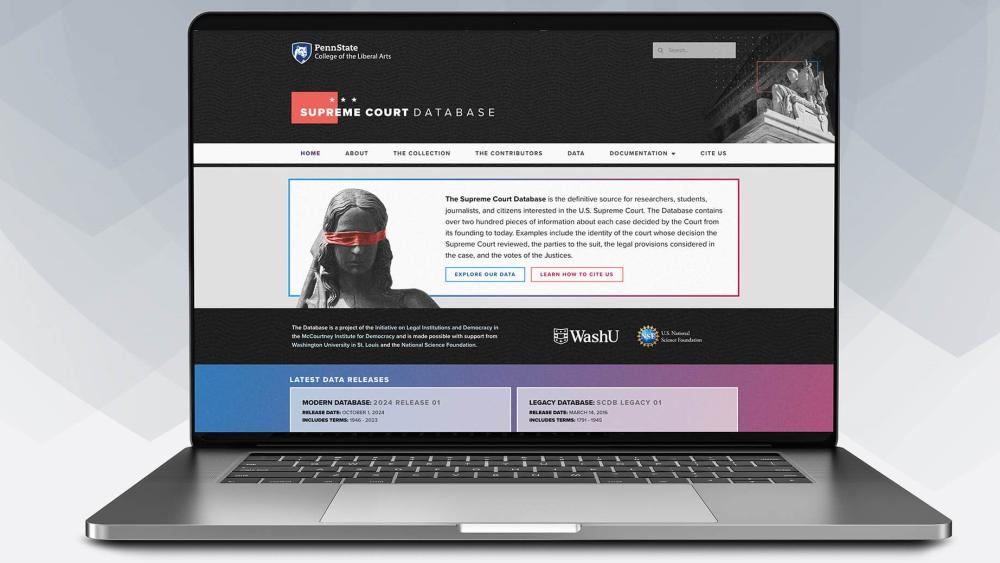See the link below. From the article:
”UNIVERSITY PARK, Pa. — The U.S. Supreme Court Database, one of the foremost research aids devoted to the nation’s highest court, has found a new home at Penn State.
The comprehensive, publicly accessible database, which contains information on every case decided by the Supreme Court from its first decision in 1791 to today, has officially transitioned from its longtime overseer, Washington University in St. Louis (WashU), to the Department of Political Science in Penn State's College of the Liberal Arts.
Michael J. Nelson, department head and professor of political science, was asked to serve as a principal investigator on the database by Lee Epstein, Ethan A.H. Shepley Distinguished University Professor at WashU.
Since its creation four decades ago, the database has come to be regarded as “the spine for all quantitative scholarship on the Supreme Court,” said Nelson, who will collaborate with the college's McCourtney Institute for Democracy on research, education and outreach efforts that involve the database.
“This is the record for political scientists studying the Supreme Court. What cases got decided each term, how the justices voted — the sort of essential information you need about every case,” Nelson said. “To me, it was important to keep the database moving forward, because it’s been so important to so many studies over decades. For us, it’ll be good for our graduate training, good for undergraduate students. And it’s nice that it’s looped in with the McCourtney Institute and the work they’re doing. It should do a lot for the reputation of the department and the college.””
…
”Meanwhile, journalists from publications including The New York Times, The Washington Post, The Wall Street Journal, 538 and SCOTUSblog have used the database to give readers critical historical context. The Times' longtime Supreme Court correspondent, Adam Liptak, has worked closely with Nelson, Epstein and WashU Chancellor Andrew D. Martin to provide ongoing data-driven coverage of the Supreme Court’s work. In July, they provided analysis for his article on the court’s recently completed term.
“It’s gratifying to see our data make The New York Times,” Nelson said. “It’s great for the department and the college because it tells people that if you study the court, this is a great place to be. Hopefully, it’ll help with our grad school recruitment, given it is such a great resource for students. We have the opportunity now to build on what’s already this really strong foundation, and I’m very excited to get to do it.””

 www.psu.edu
www.psu.edu
A boon to recruiting, of graduate students.
”UNIVERSITY PARK, Pa. — The U.S. Supreme Court Database, one of the foremost research aids devoted to the nation’s highest court, has found a new home at Penn State.
The comprehensive, publicly accessible database, which contains information on every case decided by the Supreme Court from its first decision in 1791 to today, has officially transitioned from its longtime overseer, Washington University in St. Louis (WashU), to the Department of Political Science in Penn State's College of the Liberal Arts.
Michael J. Nelson, department head and professor of political science, was asked to serve as a principal investigator on the database by Lee Epstein, Ethan A.H. Shepley Distinguished University Professor at WashU.
Since its creation four decades ago, the database has come to be regarded as “the spine for all quantitative scholarship on the Supreme Court,” said Nelson, who will collaborate with the college's McCourtney Institute for Democracy on research, education and outreach efforts that involve the database.
“This is the record for political scientists studying the Supreme Court. What cases got decided each term, how the justices voted — the sort of essential information you need about every case,” Nelson said. “To me, it was important to keep the database moving forward, because it’s been so important to so many studies over decades. For us, it’ll be good for our graduate training, good for undergraduate students. And it’s nice that it’s looped in with the McCourtney Institute and the work they’re doing. It should do a lot for the reputation of the department and the college.””
…
”Meanwhile, journalists from publications including The New York Times, The Washington Post, The Wall Street Journal, 538 and SCOTUSblog have used the database to give readers critical historical context. The Times' longtime Supreme Court correspondent, Adam Liptak, has worked closely with Nelson, Epstein and WashU Chancellor Andrew D. Martin to provide ongoing data-driven coverage of the Supreme Court’s work. In July, they provided analysis for his article on the court’s recently completed term.
“It’s gratifying to see our data make The New York Times,” Nelson said. “It’s great for the department and the college because it tells people that if you study the court, this is a great place to be. Hopefully, it’ll help with our grad school recruitment, given it is such a great resource for students. We have the opportunity now to build on what’s already this really strong foundation, and I’m very excited to get to do it.””

US Supreme Court Database now housed in Penn State Department of Political Science | Penn State University
The U.S. Supreme Court Database, which contains information on every case decided by the Supreme Court from its first decision in 1791 to today, has officially transitioned from its longtime overseer, Washington University in St. Louis, to the Department of Political Science in Penn State's...
A boon to recruiting, of graduate students.

